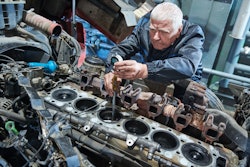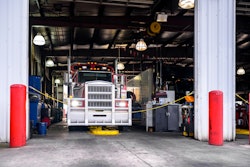Bad credit can add tens of thousands of dollars to the price of a truck or a house by increasing the cost of borrowing money. Today's world isn't what we were in during the late-2008 credit crunch, when lending terms tightened to levels never before seen. Yet interest rates have been on the rise since 2022, and having good credit continues to be important for any paysoff in much better rates than what bad-credit borrowers are forced to accept.
An owner-operator with bad credit may get turned down by the fleet to which he or she hoped to lease. He or she may get the cold shoulder from a government agency when applying for a loan to purchase a low-cost anti-idling kit. Lucrative military or otherwise sensitive freight might never go onto his or her truck because the Pentagon or other shippers don’t consider them a good risk.
Keep in mind that for a self-employed person, personal credit and business credit are virtually indistinguishable. Self-employed people sometimes want to show a loss at yearend for tax purposes, but be sure you’re able to explain that negative net income to a lender.
When you seek financing from a truck manufacturer, your local bank or any other lender, you can try to make clear to the loan officer the distinction between your business finances and your personal finances. Credit bureaus, however, don’t make that distinction; they just crunch the numbers to determine your credit rating.

[Related: How to build business for trucking's down cycles]
Here’s a breakdown for what exactly makes up your credit score:
- Your payment history: 35%
- Outstanding debt: 30%
- The length of your credit history: 15%
- The types of credit you use: 10%
- The new credit you request: 10%
The good news is that even the worst credit situation can be improved. As little as two or three years of good payment behavior can make a positive difference in your credit score, which assigns more weight to recent acts than to older ones.
In the meantime, lenders are out there for truck buyers with shakier levels of credit, often described as C-level or D-level credit (where A-level is stellar and B generally good). That's especially true in the used-truck market. As you've read in previous parts of the Equipment and Maintenance section of Overdrive's Partners in Business, some motor carriers always are looking to groom owner-operators in their own lease-purchase programs, providing bookkeeping and business advice to help them succeed.
[Related: There's plenty to consider before entering a lease-purchase agreement with a motor carrier]
In the general lending market, those with a credit score in the low 600s probably can find a lender but likely will have to put down 20% or more as opposed to the traditional 10% or 15%. Buyers with a credit score in the 500s, on the other hand, may be out of luck outside of a lease-purchase arrangement -- at least temporarily.
The Used Truck Association recommends this three-step process for climbing out of a bad-credit hole:
- Be willing to start with a cheap used truck, coupled with a strong maintenance savings plan.
- Bite the bullet on interest rates. You might pay 18% or 20% interest, but on a $40,000 truck, that means only an extra $60 to $80 a month.
- Work on improving your credit rating and qualifying to refinance the loan at a better rate in a year or two.
[Related: Time management can make or break an owner-operator's business]
There are many ways to improve your credit rating, though it takes time. The obvious ones include:
If you’re in arrears on any accounts, pay what you owe, including penalties, as fast as possible, even if it means living off ramen noodles.
Pay bills, including all personal bills, on time. Often this means making a business budget and a household budget and sticking to them, which is a good practice even when your credit is good.
Reduce your credit card balances. The ideal is to pay off each one monthly to avoid interest, but even if you can’t manage that just yet, pay them down until each balance is no more than half the card limit.
Consolidating your credit card debt onto one card can be worthwhile, but only if you can find a card that will enable you to do that without costing you more in the long run. MyFICO.com offers a free online calculator that can show you whether such an offer really is a good deal.
Avoid signing up for new cards. The average American makes fewer than two credit applications a year, so if you do even three in a given year, you’re hurting your credit score. Your ideal ratio should be one credit card for each installment loan, up to five cards. That means your truck loan “earns” you one credit card, your mortgage a second credit card and so on.
On the other hand, if you have an old credit card that you barely use anymore, don’t be too quick to close it out. Its mere existence provides a boost to your credit score, 15% of which depends on the length of your credit history -- or, in other words, how long you’ve been someone’s good customer.
Don’t co-sign a loan, even if you’re trying to help out a close friend or relative. In many states, if the primary borrower misses payments, the creditors can turn to the co-signer for satisfaction. You could lose your truck -- even your house.
Use what you save. Once you’re current on your truck and mortgage payments and have paid off your credit card debt, you’ll have extra money each month that’s no longer being spent on interest and penalties. Put this “found money” into your emergency fund or your retirement savings, or invest it.









